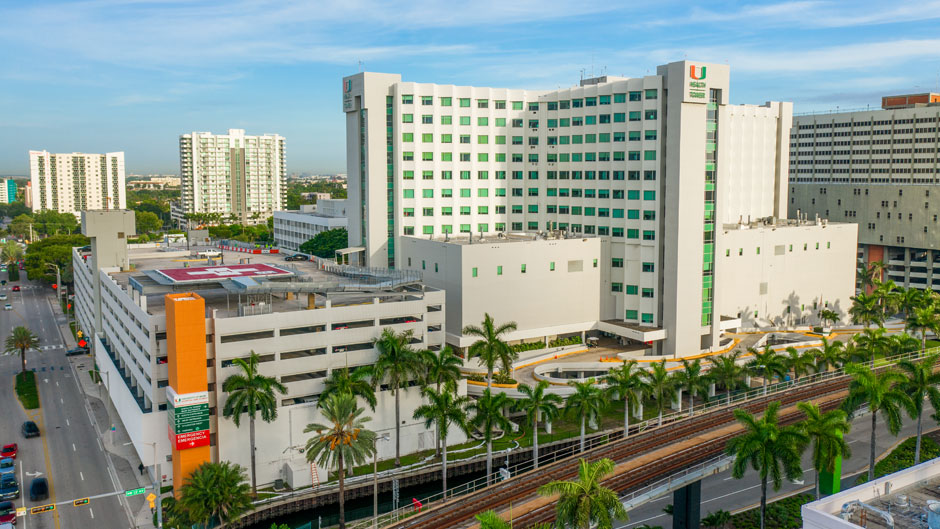Suppose it’s 2 o’clock in the morning and your fever is spiking, your cough is worsening, and your dread is growing. After months of mask-wearing, handwashing, and social distancing, you fear COVID-19 has finally caught up to you.
What do you do? With students, faculty, and frontline staff returning to the Coral Gables and Rosenstiel School campuses, the University of Miami has established the UHealth Personalized Medicine Program. It will provide prompt, tailored answers, and when needed, testing, remote monitoring, and fast-track walk-in clinical or emergency care to University students and personnel who have any concerns related to the novel coronavirus—even at 2 a.m.
“If anyone needs help anytime, day or night, then we are available to them with the latest in technology and 24/7 consultations or visits,” said Dr. Roy Weiss, chairman of the Miller School of Medicine’s Department of Medicine and the University’s chief medical officer for COVID-19, who is leading the personalized medicine program with Rafic Warwar as chief administrative officer. “We view it as a natural extension of our deep concern and commitment to the total well-being and health of our students, faculty, and staff. It’s how a great health system benefits the entire University.”
Combined with the panoply of other initiatives the University is employing to detect and control the virus, President Julio Frenk said UHealth’s resources and expertise should instill confidence as the University prepares to resume classes on Aug. 17, when the Fall 2020 semester begins.
“We are passionate about offering an on-campus experience for our students, but at the same time we must deal realistically with the challenges of the pandemic,” Frenk said. “The personalized medicine program is a key element of the solution. With UHealth leading the way, we are uniquely positioned to provide the latest monitoring, tracking, and treatments—just as one would expect from an institution at the forefront of transformative research and high-quality health care.”
To facilitate the around-the-clock service, UHealth’s COVID-19 Screening Hotline, 305-243-ONE-U (6638), is expanding its weekday and Saturday hours to operate 24 hours a day, seven days a week. Now, a clinical team will always be available to screen faculty and staff members and, if needed, coordinate their care with an on-call physician who can provide immediate consultations. Students will have a similar option through the Student Health Service.
Other options will depend on each caller’s situation. For those who are concerned about exposure to the virus, but are not exhibiting symptoms, members of the hotline team can make an appointment for a COVID-19 test. For callers who are feeling poorly and need immediate care, hotline personnel will arrange an immediate telehealth visit or, if necessary, a visit to one of UHealth’s walk-in clinics or to the emergency room at UHealth Tower.
In either case, patients will receive fast-track care from UHealth clinicians who will be expecting their arrival. For students who have no safe way of reaching such care, transportation will be provided.
Callers who are awaiting test results, or feeling minor symptoms and must quarantine at home, could choose to be remotely monitored with one of the University’s new Tyto devices. The instrument is adding a fourth T—televigilence—to the University’s extensive protocols for testing, tracking, and tracing the virus on its campuses. The palm-sized device enables UHealth providers to remotely examine a patient’s throat, ears, lungs, and heart, and keep track of all their vitals, including the oxygen level in their blood—a key marker of the respiratory disease caused by the highly contagious virus.
Weiss, who recently introduced the telehealth devices to the University, said on-campus faculty members who request a Tyto could get one, if they are available. “If they would feel more comfortable knowing that they have a doctor in their house, so to speak, who could hear their heart and lungs and talk to them 24/7, we’ll do our best to make that happen,” he said.
He also noted that, since there are no blueprints for dealing with the new virus, the personalized medicine program is a work in progress, and it likely will evolve over time with crucial feedback from the University community. To that end, three advisory committees—one each for students, staff, and faculty—will meet regularly to keep communication channels open and UHealth leaders informed of what’s working and what needs improvement.
Patricia A. Whitely, vice president for student affairs, will co-lead the committee for students; Mary Harper Hagen, vice president for human resources, the one for staff; and Guillermo “Willy” Prado, vice provost for faculty affairs, and professor Linda Neider, chair of the Faculty Senate, the one for faculty. Weiss also will be in daily contact with President Frenk; Jacqueline A. Travisano, executive vice president for business and finance; Jeffrey Duerk, executive vice president for academic affairs and provost; Joe Echevarria, CEO for UHealth; and Dr. Dipen Parekh, COO for UHealth.
“One of the few things that is certain about this pandemic is that we don’t have all the answers,” Weiss said. “We can’t predict everything that’s going to happen, but we can be nimble and prepared.”
To reach the UHealth Personalized Medicine Program, call the COVID-19 Screening Hotline at 305-243-ONE-U (6638).

